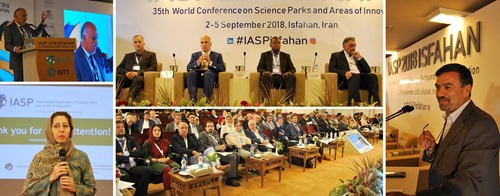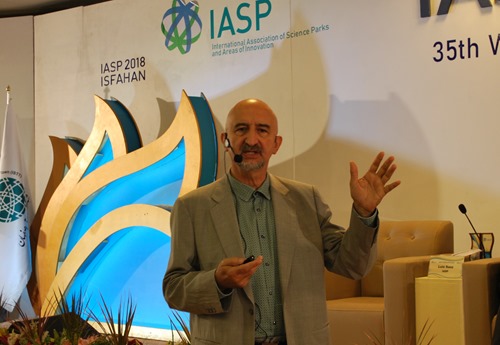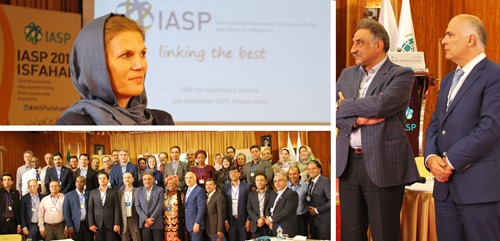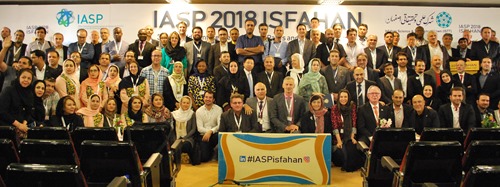Science parks and sustainable development at IASP Isfahan
/Some_of_the_speakers_and_organisers_of_IASP_Is.jpg)
Sustainable development is at the very top of the global agenda, and science parks are uniquely placed to harness the power of technology, innovation and entrepreneurship to help build sustainable cities across the world.
IASP Isfahan, which brought together 45 speakers and almost 400 delegates, including leading government, business and innovation figures from 33 countries, turned the focus of our international network on all the ways in which science parks can and are supporting sustainability and creating a better future. Hosted and organised by Isfahan Science and Technology Town (ISTT) under the theme “Towards sustainable cities and communities: Fostering innovation ecosystems”, the event saw speakers offer new insights into how science parks and other areas of innovation are leading their innovation communities as well as their cities and regions towards a more sustainable future.
Pre conference seminar
With the generous support of ISTT, the IASP Pre conference seminar brought together newcomers to the science park industry to hear from six experts in various aspects of STP management in a one-day event moderated by Chief Operations Officer Ebba Lund. With a special focus on the main building blocks of science parks and areas of innovation, attendees from around the world had the chance to compare experiences and discuss their unique challenges.
Opening Ceremony and keynote speaker
The event began with an opening ceremony led by IASP President, Josep Piqué (La Salle Technova Barcelona, Spain) who officially opened IASP Isfahan, with Director General Luis Sanz as Master of Ceremonies. ISTT President Seyed Mehdi Abtahi welcomed international delegates to Isfahan, alongside Dr Mansour Gholami, Minister of Science, Research and Technology, and Dr Sorena Sattari, Deputy President for Science and Technology.
The keynote speaker was Klaus Kunzmann (Germany), a global expert on innovative urban policy and city and regional development. He encouraged science parks and areas of innovation to focus on knowledge development, underlining the importance of the STP-university collaboration and ensuring that parks attract green industries from around the world.
Exploring cities, talent, open innovation and entrepreneurship
Collaboration with cities and communities, and the role of areas of innovation such as Atlanpole (France) and Ann Arbor SPARK (USA) in urban renewal was one of the key themes in the plenary sessions, with speakers exploring how both STPs and the technology they help develop can support implementation of the UN Sustainable Development Goals in their city, with Luis Sanz emphasising the importance of working closely and proactively with city authorities. New financing tools for SMEs in China, and the Estonian and Iranian approaches to growing a national innovation ecosystem were on the agenda, with the challenges of attracting, developing and retaining talent explored from the Brazilian, Spanish and Swedish perspectives, highlighting the need to involve young people from their communities, women and international knowledge workers to meet the skills gap in tech-related fields.
The pitch session looked at ways in which STPs are working with their cities and universities to support economic development, and presented a blueprint for sustainable, human-centred STP design that reflects the unique characteristics of a location. Josep Piqué opened a session on cutting edge applications of open innovation with a study of Silicon Valley and the changing interactions between startups and big corporations, a theme that was echoed from the Estonian perspective of matchmaking between them. Speakers from Brazil and Iran shared their experiences of using open innovation to tackle challenges in their communities, such as bringing startup solutions to the city hospital and making the STP a “mastermind” of the city. To conclude the scientific programme, Dr Mostafa Karimian Eghbal summarised the main themes in a wrap-up session that covered all the main points debated by speakers from around the world.
At the event’s closing ceremony, Josep Piqué ended his term as President, while the Isfahan team handed the IASP conference flag to next year’s organisers Atlanpole who are preparing to host us in Nantes, France. For more on this, see New president and executive board for IASP and All eyes on IASP Nantes 2019.
Held at the historic Abbasi Hotel, the event showcased the innovation community in Isfahan and marked the first time that an IASP World Conference has taken place in Iran. Both a celebration of international collaboration, and a sign of IASP’s commitment to support science parks everywhere in the world and through them, to encourage the sustainable economic development that can change lives.
/)






/canvascolor(0xffffffff)/IMG_6669_1.png)
/canvascolor(0xffffffff)/Jinnovation_Park_logo.png)
/canvascolor(0xffffffff)/2024_03_01_Brazil_PCT_Sao_Jose_Dos_Campos.jpg)
/canvascolor(0xffffffff)/MemberLogo-83906-257601.png)
/canvascolor(0xffffffff)/Adlershof_rgb.jpg)
/canvascolor(0xffffffff)/Identificador_Visual.png)
/canvascolor(0xffffffff)/PCT_VILLA_CLARA.png)
/canvascolor(0xffffffff)/2017_07_31-Pucpr.png)
/canvascolor(0xffffffff)/logo_TROKUT_Å_ibenik_PNG_2.png)
/canvascolor(0xffffffff)/buildings2.png)
/canvascolor(0xffffffff)/MemberLogo-29805-71501.jpg)
/canvascolor(0xffffffff)/MemberLogo-5652-6081.jpg)
/canvascolor(0xffffffff)/Nosp_logo-svart_(2).png)
/canvascolor(0xffffffff)/KL_LOGO_stor.jpg)
/canvascolor(0xffffffff)/2017_11_10_Turkey_Bilkent_Cyberpark.png)
/canvascolor(0xffffffff)/logotecnopole_alta_resolucion_1.jpg)
/canvascolor(0xffffffff)/2019_08_02_UAE_RTI_Park.png)
/canvascolor(0xffffffff)/GEP_Logo-01_transparant_(1)_6.png)
/canvascolor(0xffffffff)/2022_06_14_Portugal_UPTEC.png)
/canvascolor(0xffffffff)/2017_11_17_Taiwan_Southern_Taiwan_SP.png)
/canvascolor(0xffffffff)/tps.JPG)
/canvascolor(0xffffffff)/business-incubator-logo.png)
/canvascolor(0xffffffff)/WhatsApp_Image_2023-08-01_at_14.01.59_5.jpg)
/canvascolor(0xffffffff)/MemberLogo-25804-6113.jpg)
/canvascolor(0xffffffff)/MemberLogo-5779-6245.jpg)
